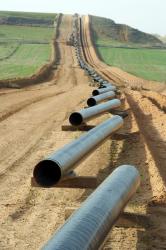Last week in the Campus Times an opinions article titled “Keystone XL unlocks TransCanada discrepancies,” by senior Alykhan Alani, was published about the Keystone XL Pipeline — which, if built, would span from Canada to Texas. The subject of this piece is not whether the pipeline is economically efficient. Rather, this article will focus on the reasons why last week’s article failed to make a convincing argument as to why the Keystone Pipeline should not be constructed.
At one point the author discussed how the pipeline’s ability to create jobs is
a myth. “As far as job creation is concerned, employment created by the pipeline will be unsustainable, short-term construction jobs,” he wrote. He called the jobs “‘here now and gone tomorrow’ positions [that] are not worth compromising citizens’ health and safety.” This point is completely irrelevant.
First of all, jobs are a cost, not a benefit. Nobody is approving this pipeline because it creates jobs, but because it will transport oil as cheaply as possible. Second of all, we should not scare people into not working somewhere in order to drive an agenda based on arguments unfit for a bumper sticker. Citizens can decide for themselves whether or not working on the pipeline is worth it. There are plenty of people that risk their well-being during work hours, including firemen, policemen, construction workers and coal miners. If we had disallowed people from working such jobs in the first place, fires would kill more, crime would flourish, buildings would not exist and we might still be burning wood for heat.
In an attempt to add credibility to his stance, the author brought up a “study” from the Cornell Global Labor Institute. Of all the references in this report, there is nothing on the economics of stimulus effects or job analysis. The report simply references a bunch of news stories, blogs and U.N. reports. It mentions how the pipeline could result in higher oil prices for some. Midwesterners, while it fails to realize that, since it is resulting in cheaper oil overall, the prices will go down for most people who consume the pipeline’s oil. Is that of no significance? I guess you can only expect so much when someone searches “jobs destroyed by keystone pipeline” on Google and clicks on the first hit.
The author brought up the Ogallala Aquifer and how the Keystone Pipeline could result in contamination, which would be “nearly impossible to mitigate and would have serious consequences regarding future consumption and use,” according to his argument. Not only was the true value of this water not examined closely, but the article also disregarded technology developed in order to clean up the very spills this pipeline could experience if constructed. There are even bacteria that could consume oil — which happened in the clean-up effort for the BP oil spill.
Not only is a full story on the hazards of this pipeline lacking, but there is also a lack of discussion on the risks of regular drilling and transportation via oil tankers. The author supposed that all oil transported through the pipeline will only be extracted as a result of the pipeline itself. This is not true. The pipeline merely provides a safer way to move the oil, for which there is a demand. It is more efficient and relieves us of many risks associated with moving oil on tankers, trains, buses and skateboards.
To conclude his point, the author suggested that we “invest in green energy products and services, which would … decrease our dependency on petroleum.” No green energy sources presently have the ability to sustain anything close to our living standards. Nothing even comes remotely close. Some of them are not actually environmentally friendly — but that is another issue entirely.
For someone who seems overly obsessed with job creation, the author seems too apprehensive to mention the miniscule impact that “going green” has had on this cou ntry’s job market.
In 2008, President Barack Obama pledged to create 5 million “green jobs,” a term itself which is very subject to definitions that are corrupt and misleading. Has he succeeded? Not by any measure. California was given $186 million to make homes “greener.” Fewer than 600 jobs have resulted. A separate $59 million investment was made by Washington to train people for green jobs in the same state. This brought about fewer than 800 jobs. Should we even start talking about Washington’s recent trouble with investing hundreds of millions into solar panels? The jobs are not there because the demand is not there. And why is that? Because green technology is not even close to providing us with what this pipeline might be able to.
I am not qualified to say this pipeline is certainly worthwhile, but so far I have not seen a compelling argument to the contrary.
Warhit is a member of
the class of 2012.






